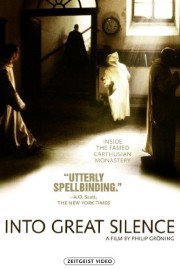Into Great Silence
For 162 minutes, German director Philip Groning gives us a glimpse in the life of Carthusian Monks at the famous Grande Cartreuse monastery in France. In 1984, he had approached the Order about filming a documentary there, chronicling the monastic way of life they lead. At the time, they were not ready for his cameras. In 2000, they were, and for six months Groning lived the life he captures on film.
“Into Great Silence” is a film requiring profound patience and dedication of its’ viewer, much like the way of life it documents. I wish I’d seen this film in theatres when it was released in 2007- at home on DVD, there’s too many opportunities for distraction. This isn’t a reflection on the film- which is a contemplative and rewarding experience- but a reflection on myself. I could not make the commitment the members of this Order have.
The film does not fit into what we consider a documentary. There’s no narration, no contextual title cards (although he does offer Bible passages reflective of the Carthusians’ devotion), no talking head interviews (although he does include head-on shots of members). There’s just the Order, going about their lives. They’ve taken a vow of poverty, and only during ceremonial gatherings (like when they welcome two new members to their way of life), times of prayer, and their weekly walks outside do they speak. In a way, this is the purest form of documentary- with only himself as his crew (they wouldn’t accept his offer any other way), there was no other way for Groning to approach this film.
In a way, the film is similar to the works of Bergman and Tarkovsky in how it approaches the spiritual in man and nature (Groning includes several shots of the lands around Grande Chartreuse, and they are a thing of beauty). Only in lives so simple, in an environment so serene, could such a level of spirituality be found. This is a place untouched by time, with people devoted to the purest practice of their devotion to God. Both of those masters would have been right at home, I think. Tarkovsky- the Russian poet whose films (“Andrei Rublev,” “The Mirror,” “Stalker”) were near transcendent in their spiritual quests- to be sure was capable of such visual and emotional beauty in his film. But even if Bergman’s faith was something he struggled with his entire career and life, there’s no denying the spiritual depths he found even if God’s existence seemed out of reach for his characters (see “Wild Strawberries,” “Saraband,” and “Persona” if you don’t believe me). I think even he would have been moved by the Carthusians’ way of life.
You’re unlikely to find a more spiritually rewarding film in the past ten years, not to mention a more cinematically challenging one when it comes to religion. But believe me when I say the commitment is well worth the risks. From the haunting scenes of The Night Office- where the monks go and pray for 2-3 hours at a time every night at 12:15am- to the quiet moments of reflection and study we witness with the newer members of the Order in their rooms. From moments where the monks, in unison, stop what they’re doing and join in prayer to God to their methodical discussions on hand-washing on their Monday walks outside.
“Into Great Silence” isn’t without sound, but in fact raises our awareness of sound by eliminating them almost completely. In a way, it offers us a chance at the same level of peace the Carthusians, in their quiet search for the divine in their lives, seem to live with every day, even if it’s just for 2 1/2 hours.










